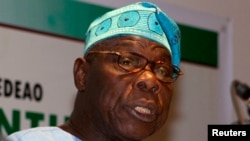Former Nigerian President Olusegun Obasanjo said Monday the African Union-appointed team he heads will visit all areas of South Sudan, including battlefields, as they gather evidence of human rights abuses committed during the country's ongoing conflict.
"We will not shy away from any place because of clashes or all that because that is mandate of our commission," Obasanjo said as he and the rest of the five-member African Union Commission of Inquiry in South Sudan (AUCISS) arrived in Juba at the start of a visit to the country.
"If we do not go around, how do we know where bleeding is so that we can advise how to stop the bleeding and to get a process of healing?" Obasanjo said.
The investigators are expected to meet with government and opposition officials, and with ordinary citizens, including internally displaced persons (IDPs).
The African Union formed the five-member Commission of Inquiry in March to investigate human rights violations and other abuses committed during the armed conflict in South Sudan.
Mr. Obasanjo said the government and opposition have cooperated with his team. But he says the investigators still have a long way to go to find out what atrocities were committed, and by whom.
"We need to do more and that is why we are here... The job we are given is not an easy job,” he said.
The AU team is expected to spend five days in South Sudan before returning to Addis Ababa to write up and file their report.
The commission previously visited South Sudan in April, shortly after it was established by the AU’s Peace and Security Council, and was supposed to file its report on South Sudan in June, but renewed fighting in South Sudan prevented it from doing so.
At a meeting two weeks ago, African Union heads of state and government extended the investigating team’s mandate for three months to allow it to hold more consultations and gather more evidence.
Along with its report on rights abuses in South Sudan, the team is expected to make recommendations on how South Sudanese can heal the wounds of war, reconcile with one another, punish those responsible for atrocities, and carry out institutional reforms.




